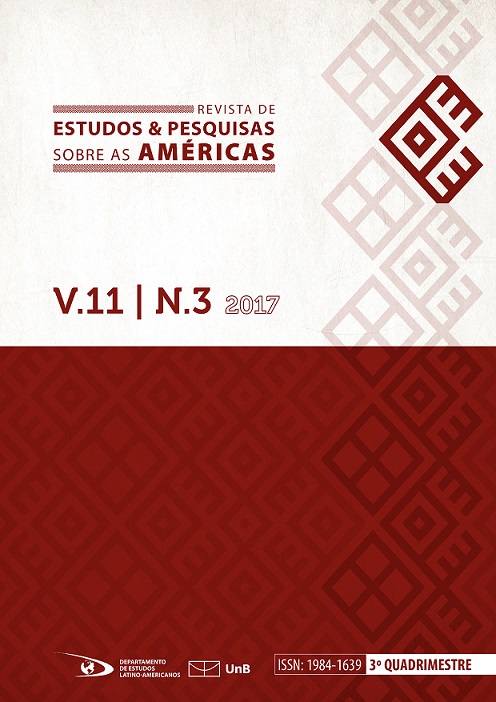La Especificidad del Pensamiento Político Latinoamericano: nacionalismo progresista, liberalismo conservador
Keywords:
Teoría política; Pensamiento político; Estudios Latinoamericanos.Abstract
Este texto, de carácter ensayístico, sustenta la hipótesis de que el pensamiento político latinoamericano, situado en sociedades periféricas que dialogan con la producción intelectual de los países centrales, posee características específicas que modifican el sentido original de los conceptos elaborados en estos últimos. Centramos nuestra atención en las variedades locales del liberalismo y el nacionalismo. Comenzamos presentando nuestras principales ideas y el marco teórico en el que se ubican. Luego ofrecemos algunos ejemplos claros de esa especificidad, y de la incapacidad recurrente de dar cuenta de ella constatada en buena parte de la reflexión regional. La selección de casos no pretende validez estadística sino ilustrativa. Nuestras principales conclusiones apuntan a la importancia de situar dónde y cuándo se construye el pensamiento (particularmente con relación a la historia política de las sociedades que lo elaboran), y a la validez de distinguir centro y periferia como lugares epistemológicos.
Palabras clave: Pensamiento situado; Pensamiento universal; América Latina; Teoría política.
The Specificity of Latin-American Political Thought: progressive nationalism, conservative liberalism
Abstract
In this essay we support the hypothesis that Latin American political thought, situated in peripheric societies that dialogue with the intelectual production of central countries, possesses specific characteristics that modify the original sense of the concepts that were elaborated there. Our focus are the local varieties of liberalism and nationalism. We start by presenting our main ideas and their theoretical origins. Afterwards, we offer some clear examples of that specificity, and of the recurrent incapacity of many of the region's thinkers to take it into account. The case selection does not seek statistical validity, but rather for the cases to be illustrative. Our main conclusions point towards the importance of situating where and when the construction of thought takes place (particularly regarding the political history of the societies that elaborate it), and the importance of distinguishing between center and periphery as different epistemological places.
Keywords: Situated thought; Universal thought; Latin America; Political theory.
A Especificidade do Pensamento Político Latino-americano: nacionalismo progressista, liberalismo conservador
Resumo
O presente ensaio sustenta a hipótese de que o pensamento Latino-Americano, situado em sociedades periféricas que dialogam com a produção intelectual dos países centrais, possui caraterísticas específicas que modificam o senso original dos conceitos elaborados em esses últimos. A nossa atenção está nas expressões locais do liberalismo e o nacionalismo. Começamos apresentando as nossas principais idéias e o marco teórico no qual elas se ubicam. Posteriormente oferecemos alguns exemplos que ilustram claramente essa especificidade, e a incapacidade recorrente de dar conta dela em boa parte de reflexão regional. A seleção de casos não aponta à ter validez estatística, porém à ser ilustrativa. As nossas conclussões principais indicam que é importante situar aonde e quando se constrói o pensamento (particularmente em relação à história política das sociedades que elaboram-no), e à importância de differenciar centro e periferia como lugares epistemológicos.
Palavras-chave: Pensamento situado; Pensamento Universal; América Latina; Teoria Política.
Downloads
Published
Issue
Section
License
The published material is the property of the Journal, and may be reproduced in whole or in part with indication of the source.
Copyright: Authors will be responsible for obtaining the copyright of the material used. Authors who publish in this journal agree to the following terms:
a)Authors retain the copyright and grant the journal the right of first publication, with the work simultaneously licensed under
the Creative Commons Attribution License which allows the sharing of work with acknowledgment of authorship and initial publication in this journal.
b) Authors are authorized to take additional contracts separately, for non-exclusive distribution of the version of the work published in this journal (eg, publish in institutional repository or as a book chapter), with acknowledgment of authorship and initial publication in this journal.
c) Authors are allowed and encouraged to publish and distribute their work online (eg in institutional repositories or on their personal page) at any point before or during the editorial process, as this can generate productive changes as well as increase the impact and the citation of the published work (See The Effect of Free Access).
















